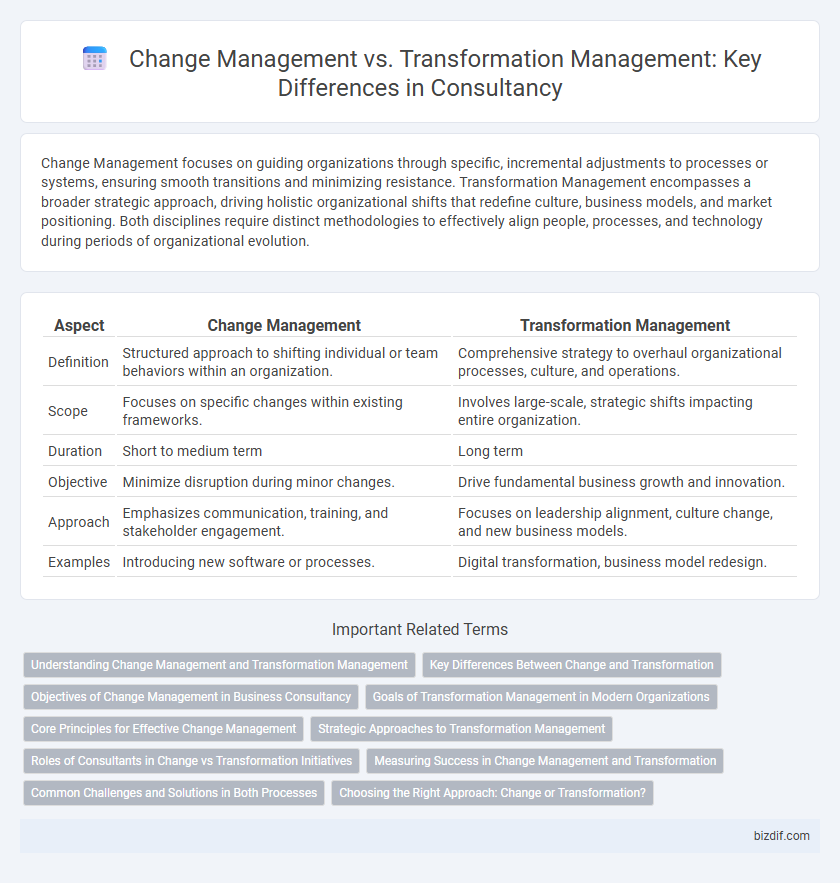Change Management focuses on guiding organizations through specific, incremental adjustments to processes or systems, ensuring smooth transitions and minimizing resistance. Transformation Management encompasses a broader strategic approach, driving holistic organizational shifts that redefine culture, business models, and market positioning. Both disciplines require distinct methodologies to effectively align people, processes, and technology during periods of organizational evolution.
Table of Comparison
| Aspect | Change Management | Transformation Management |
|---|---|---|
| Definition | Structured approach to shifting individual or team behaviors within an organization. | Comprehensive strategy to overhaul organizational processes, culture, and operations. |
| Scope | Focuses on specific changes within existing frameworks. | Involves large-scale, strategic shifts impacting entire organization. |
| Duration | Short to medium term | Long term |
| Objective | Minimize disruption during minor changes. | Drive fundamental business growth and innovation. |
| Approach | Emphasizes communication, training, and stakeholder engagement. | Focuses on leadership alignment, culture change, and new business models. |
| Examples | Introducing new software or processes. | Digital transformation, business model redesign. |
Understanding Change Management and Transformation Management
Change Management involves structured approaches to transition individuals, teams, and organizations from a current state to a desired future state, emphasizing communication, training, and stakeholder engagement to minimize resistance. Transformation Management encompasses broader organizational shifts impacting culture, processes, technology, and business models, requiring strategic alignment and sustained leadership commitment for long-term success. Understanding both disciplines clarifies that Change Management addresses incremental adjustments, while Transformation Management drives fundamental shifts critical for competitive advantage.
Key Differences Between Change and Transformation
Change Management focuses on specific, incremental adjustments within an organization, targeting processes, technologies, or behaviors to improve efficiency and address immediate challenges. Transformation Management involves a comprehensive, strategic overhaul that redefines organizational culture, business models, and long-term vision to achieve fundamental growth and competitive advantage. Key differences include the scope, with Change Management addressing narrow, short-term goals, whereas Transformation Management drives broad, systemic, and sustained evolution.
Objectives of Change Management in Business Consultancy
Change Management in business consultancy aims to minimize resistance, ensure employee engagement, and achieve smooth adoption of new processes or technologies. The primary objectives focus on aligning organizational culture, enhancing communication strategies, and sustaining performance during transitions. Effective change management reduces disruptions, accelerates project success, and improves long-term business agility.
Goals of Transformation Management in Modern Organizations
Transformation management in modern organizations centers on aligning business processes, technology, and culture to achieve long-term strategic goals. Emphasizing innovation, agility, and sustainable growth, it drives comprehensive changes beyond incremental improvements typical of change management. Key goals include fostering organizational resilience, enhancing digital capabilities, and embedding continuous improvement to maintain competitive advantage.
Core Principles for Effective Change Management
Effective change management relies on clear communication, stakeholder engagement, and continuous feedback to ensure alignment with organizational goals. Emphasizing incremental steps, risk mitigation, and employee empowerment fosters adaptability and minimizes resistance. Core principles include transparency, accountability, and sustained support throughout the change lifecycle to drive successful outcomes.
Strategic Approaches to Transformation Management
Strategic approaches to transformation management emphasize aligning organizational vision with long-term objectives, integrating technology, culture, and processes into a cohesive roadmap for sustained change. Unlike change management, which addresses specific transitions, transformation management requires holistic planning, continuous stakeholder engagement, and adaptive leadership to drive enterprise-wide evolution. Key tactics include scenario planning, capability building, and leveraging analytics to anticipate challenges and measure impact throughout the transformation lifecycle.
Roles of Consultants in Change vs Transformation Initiatives
Consultants in change management focus on guiding organizations through specific adjustments by managing employee resistance, communication plans, and training sessions to ensure smooth adoption of changes. In transformation management, consultants play a strategic role by reshaping business models, aligning technology integration, and fostering cultural shifts to drive long-term organizational evolution. Their expertise in stakeholder engagement and continuous performance measurement is critical for both change initiatives and comprehensive transformational efforts.
Measuring Success in Change Management and Transformation
Measuring success in Change Management involves tracking employee adoption rates, stakeholder engagement, and process adherence to ensure smooth transitions. In Transformation Management, success metrics emphasize long-term business impact, including improved market position, revenue growth, and innovation capabilities. Both require real-time data analytics and feedback loops to adapt strategies and achieve desired organizational outcomes.
Common Challenges and Solutions in Both Processes
Change management and transformation management often face challenges such as resistance from employees, lack of clear communication, and insufficient stakeholder engagement, which can impede successful implementation. Both processes benefit from solutions like establishing transparent communication channels, involving key stakeholders early, and providing continuous training and support to ease transitions. Leveraging data-driven insights and agile methodologies enhances adaptability, ensuring organizations effectively manage change and transformation initiatives.
Choosing the Right Approach: Change or Transformation?
Choosing between Change Management and Transformation Management depends on the scope and impact of the initiative; Change Management targets specific adjustments within existing processes, while Transformation Management drives comprehensive shifts across organizational culture, strategy, and operations. Assessing factors such as scale, complexity, stakeholder impact, and desired outcomes is critical for determining the appropriate approach. Consulting firms often emphasize aligning the methodology with long-term business goals and risk tolerance to ensure sustainable success.
Change Management vs Transformation Management Infographic

 bizdif.com
bizdif.com